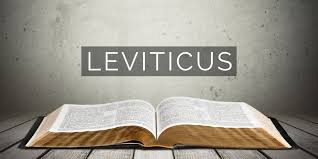Readings for the day: Leviticus 1, 2, 3, 4
Today is our first day in Leviticus. One of the hardest books for Christians to read and stay engaged with in the Bible. And yet, if we are willing to put in the work, we’ll learn some amazing things about God’s relationship with His people.
The first thing we need to understand as we approach this book is that it clearly delineates what we call the “ceremonial” law of Israel. Laws governing sacrifice. Laws governing worship. Laws governing what is holy and unholy, clean and unclean. Most of these laws were fulfilled once and for all by Jesus’ sacrifice on the cross. (In fact, all of the sacrifices we’ll read about in Leviticus foreshadow the sacrifice of the Messiah.) Because the ceremonial laws were fulfilled, Christians no longer are required to keep them. However, this doesn’t mean we can dismiss Leviticus as some antiquated piece of history not worth our time. Embedded in this book are important tenets of what we call “moral” law which still is instructive and binding on us today. The key is know which is which and how to separate out the two.
A second thing we need to remember as we approach this book is where it falls in the narrative. The people have just been saved from Egypt. They are standing at the foot of Mt. Sinai. God is still speaking to Moses. And the burning question that is on everyone’s minds is this...How can a holy God dwell with an unholy people? If God is literally going to live among them, how will they survive? The answer is sacrifice. The first seven chapters of this book describe in great detail the sacrifices that were necessary to purify the people. Animal sacrifices. Bulls. Sheep. Goats. Birds. Grain offerings. Always with oil and salt. Peace offerings. Sin offerings. Blood being thrown against the altar. Animals dissected into little pieces. It must have been hard and fairly gruesome work. The fires must have burned continually. The smoke from the sacrifices rising into the heavens in a continual stream. (It must have smelled like Greeley...all the time! How that’s pleasing to the Lord, I’ll never know!)
What’s the point of it all? To remind us every hour of every day that the penalty for our sin is death. To remind us that as bad as the stench of sacrifice may be, the stench of our sin is much, much worse. The reality is we don’t take our sin seriously enough. We don’t take God’s holiness seriously enough. We like to think we aren’t all that bad. The baseline for many of us is that we’re pretty good people. Flawed? Yes. Imperfect? Sure. Sinner? Okay. Antiquated term but we’ll go with it. God sees us - absent Christ - much differently. He sees creatures utterly deformed by their sin. Barely resembling the glory He initially created in them. He sees creatures living in complete and total rebellion against His perfect will. Creatures who are so full of selfish, prideful ambition and deceit. He sees creatures who are enslaved. Under bondage. Creatures with a terminal illness. Weak and emancipated by their sin. When He looks down from heaven on the earth, all He sees is death. Decay. Destruction. Our lives are a shell of what He intended. And for Him to enter into this world. Dwell with His people. In the perfection of His holiness and glory is to risk destroying them utterly. For God is a consuming fire. (Deut. 4:24) So God institutes the sacrificial system in order to give God’s people an opportunity to purify themselves so they may live their lives before the Lord without fear. And because the sacrifices are animals, they have to be repeated with regularity in order to maintain the people’s purity before God.
All this changes with the coming of Jesus. All this changes when Jesus - the perfect sacrifice - goes to the cross. Once and for all, He satisfies God’s holy justice. Once and for all, He purifies God’s people. Once and for all, He pays the penalty for the people’s sin. I love how the Book of Hebrews puts it, “But when Christ appeared as a high priest of the good things that have come, then through the greater and more perfect tent (not made with hands, that is, not of this creation) he entered once for all into the holy places, not by means of the blood of goats and calves but by means of his own blood, thus securing an eternal redemption. For if the blood of goats and bulls, and the sprinkling of defiled persons with the ashes of a heifer, sanctify for the purification of the flesh, how much more will the blood of Christ, who through the eternal Spirit offered himself without blemish to God, purify our conscience from dead works to serve the living God. Therefore he is the mediator of a new covenant, so that those who are called may receive the promised eternal inheritance, since a death has occurred that redeems them from the transgressions committed under the first covenant.” (Heb. 9:11-15)
